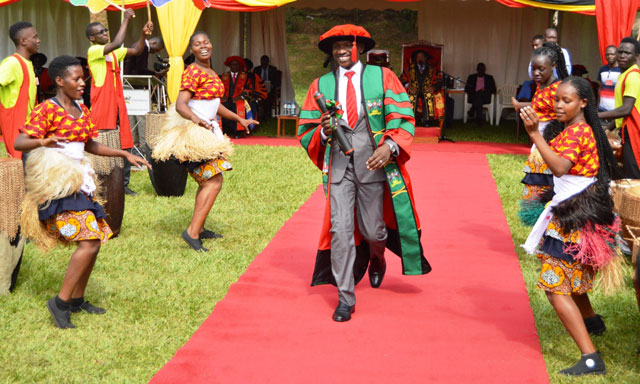
Kampala, Uganda | THE INDEPENDENT | During Makerere University’s week-long 72nd graduation ceremony, over 100 docrate degrees were conferred upon students from several disciplines.
Experts expect the doctoral graduates to bring new innovations and ideas “to the table” if they are to be recognized.
Dr Anthony Tibaingana, a lecturer at the College of Business and Management Sciences at Makerere University, says unless the PHDs deliver change to society, they will be looked at as no more than the usual graduates.
Talking to our reporter on the sidelines of the graduation, Tibaingana shared that ideally doctoral graduates should bring fresh knowledge, discovering new things (innovation and invention), and developing new skills.
From Tibaingana’s view, much of the PhDs and Research Output currently produced by Makerere and other universities in Uganda do not provide any significant contributions towards the societal change or development thus rendering them ‘worthless’.
“We need an honest discussion about this subject,” Tibaingana told our reporter. “Ideally, PhDs are designed not to win kudos within the academic community, but rather to discover something new that will be useful for practitioners and have real social impact. Today, PhDs are not yielding any tangible results.”
Tibaingana added that even when a PhD graduate generates new knowledge or innovates something, most of them remain in laboratories or university libraries where they gather dust for years. “It can often feel like contemporary academia is more about chasing citations,” he lamented. “Most academic work is shared only with a particular scientific community, rather than policymakers or businesses, which makes it entirely disconnected from practice.”
He added that several PhDs are not designed to solve any problem as they are dictated by funders: “Many people take up PhDs or research projects suggested by funders but have nothing to do with our societies, this leaves the societal problems unattended as researchers spend energies on issues that don’t matter.”
Professor Ezra Suruma, the Chancellor of Makerere University, also stated that there are several challenges in communities that need to be addressed, emphasizing the need for researchers to focus on seeking concrete answers.
Professor Suruma however stated that in order for PhDs and other research outputs to be useful, they must be translated into a format usable by members of the public and policymakers rather than being left on their own within Makerere.
Professor Barnabas Nawangwe, the vice-chancellor of Makerere University, seems to be concerned about the same issue. Nawangwe, who claims that Makerere University’s research budgets have been steadily increasing in recent years, is quick to point out that the university is presently facing a problem in translating research and breakthroughs into services and products that would benefit the community.
Professor Nawangwe observed that as the oldest institution of higher learning transitions to a research-driven model, specific emphasis must be placed on ensuring that their research has a societal effect.
Although much of the research fail to be turned into products and services, Nawangwe adds that it should be noted that Makerere University has in the recent years produced several prototypes with some of them having potential for commercialization but the innovators and the university as well lack resources to push them to the market.
Indeed Zaid Kitagano, 2022 Makerere University PhD graduate whose thesis focused on the dynamics of university technology transfer, stated that throughout his study, he discovered that institutions are disconnected from society, policymakers, and businesses.
Kitagano went on to say that the gaps must be bridged by forging direct connections between communities, industry, and policymakers, as well as universities, to support the development of tangible services and products.
A 2021 study by Makerere University College of Education and External Studies found in Uganda 1,179 PhDs of which 1,025 are from public universities while 172 are from private universities. However, it also queried Uganda’s Doctor of Philosophy (PhD) graduates saying that most of them do not provide any significant contribution to the country.
The study blamed the lack of a curriculum for many doctoral studies, and the shortage of infrastructure to finance training among other factors to be responsible for the problem at hand.
****
URN
 The Independent Uganda: You get the Truth we Pay the Price
The Independent Uganda: You get the Truth we Pay the Price


